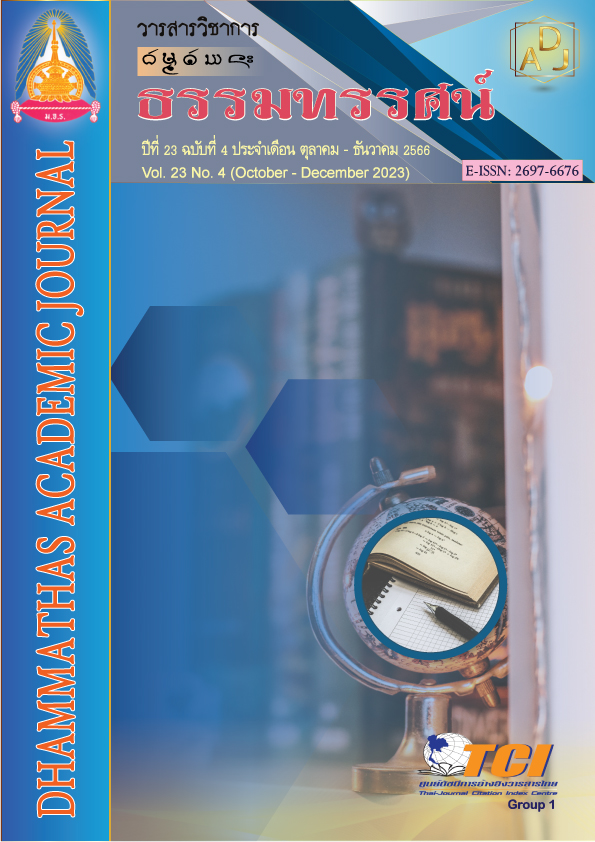Spiritual Leadership of School Administrators in the Digital Age
Main Article Content
Abstract
Thai education management has always been evolving. It may be due to the internal and external factors causing society to change. As a result, Thai education must be adapted to modernization and keep pace with changes to achieve development that is on par with other civilized countries. Therefore, spiritual leadership that can build credibility, faith, vision, and motivation, raise awareness, and value performance by developing positive organizational potential is a new paradigm that can be promoted and supported in the organization to achieve its objectives effectively. Thus, it influences to drive Thai education quality.
Spiritual Leadership of School Administrators in the Digital Age is the era of applying the technology of the modern world that is full of the speed of change together with good attributes, knowledge, ability, skills, competencies, morality, and ethics in the administration in order to move towards to the potential development, quality, and the highest efficiency of the changes that occur. The 21st century School administrators must therefore focus on the administration that can lead the organization to its objectives, achieve the goals or vision set with quality and also increase the competency in developing humans to have the capability for sustainable development. Building spiritual leadership in schools is very important in the digital age because it helps school personnel to love, trust, and cooperate in enhancing knowledge together. Dedicating energy to various operations to achieve the goals, strategies, and visions that benefit the school, society, and nation.
Article Details

This work is licensed under a Creative Commons Attribution-NonCommercial-NoDerivatives 4.0 International License.
เพื่อให้เป็นไปตามกฎหมายลิขสิทธิ์ ผู้นิพนธ์ทุกท่านต้องลงลายมือชื่อในแบบฟอร์มใบมอบลิขสิทธิ์บทความ ให้แก่วารสารฯ พร้อมกับบทความต้นฉบับที่ได้แก้ไขครั้งสุดท้าย นอกจากนี้ ผู้นิพนธ์ทุกท่านต้องยืนยันว่าบทความ ต้นฉบับที่ส่งมาตีพิมพ์นั้น ได้ส่งมาตีพิมพ์เฉพาะในวารสาร วิชาการธรรม ทรรศน์ เพียงแห่งเดียวเท่านั้น หากมีการใช้ ภาพหรือตารางของผู้นิพนธ์อื่นที่ปรากฏในสิ่งตีพิมพ์อื่นมาแล้ว ผู้นิพนธ์ต้องขออนุญาตเจ้าของลิขสิทธิ์ก่อน พร้อมทั้ง แสดงหนังสือที่ได้รับการยินยอมต่อบรรณาธิการ ก่อนที่บทความจะได้รับการตีพิมพ์References
กระทรวงศึกษาธิการ กรมวิชาการ. (2544). พระราชบัญญัติการศึกษาแห่งชาติ พ.ศ. 2542 และที่แก้ไขเพิ่มเติม (ฉบับที่ 2) พ.ศ. 2545. กรุงเทพฯ: กระทรวงศึกษาธิการ.
จิรพล สังข์โพธิ์ และคณะ. (2560). ภาวะผู้นำในการบริหารองค์กรยุคดิจิทัล กรณีศึกษา: องค์กรไอที และองค์กรที่เกี่ยวข้องกับไอทีในเขตกรุงเทพมหานครและปริมณฑล. เข้าถึงได้จาก http://cio.citu.tu.ac.th/cio2017/?p=410
ณัฏฐณิชา พรปทุมชัยกิจ. (2564). ภาวะผู้นํายุคดิจิทัลของผู้บริหารสถานศึกษา สังกัดสํานักงานเขตพื้นที่การศึกษามัธยมศึกษาศรีสะเกษ ยโสธร. วารสารวิชาการ มหาวิทยาลัยราชภัฏศรีสะเกษ, 15(2), 50-64.
ทิพวรรณ ล้วนปสิทธิ์สกุล. (2562). คุณลักษณะผู้บริหารสถานศึกษาขั้นพื้นฐานที่สอดคล้องกับเป้าหมายการศึกษาของนโยบายไทยแลนด์ 4.0. (วิทยานิพนธ์ปรัชญาดุษฎีบัณฑิต). กรุงเทพฯ: มหาวิทยาลัยศิลปากร.
นพพล ศุภวิทยาเจริญกุล. (2560). ภาวะผู้นำของผู้บริหารสถานศึกษา สังกัดสำนักงานเขตพื้นที่การศึกษาประถมศึกษาสกลนคร เขต 1. (วิทยานิพนธ์ครุศาสตรมหาบัณฑิต). สกลนคร: มหาวิทยาลัยราชภัฏสกลนคร.
ปณตนนท์ เถียรประภากุล. (2561). ภาวะผู้นำของผู้บริหารสถานศึกษาในยุคการศึกษา 4.0. วารสารคณะมนุษยศาสตร์ สังคมศาสตร์ และศิลปะ, 11(2), 1994-2013.
พงศ์เทพ สุธีรวุฒิ. (2552). การจัดการระบบสุขภาวะ. เข้าถึงได้จาก http://www.oknation.net/blog/pongtheps/
พระธรรมโกศาจารย์ (ประยูร ธมมจิตโต). (2549). พุทธวิธีบริหาร. กรุงเทพฯ: มหาจุฬาลงกรณราชวิทยาลัย.
พัชนี สมกำลัง และยุทธชัย ไชยสิทธิ์. (2555). แนวคิดความเป็นผู้นำทางจิตวิญญาณ: การประยุกต์ใช้ในวิชาชีพพยาบาล. วารสารสภาการพยาบาล, 27(4), 16-25.
เพ็ญนภา ศรีแปลก. (2563). การศึกษาภาวะผู้นำของผู้บริหารสถานศึกษาขั้นพื้นฐาน สังกัดสำนักงานเขตพื้นที่การศึกษาประถมศึกษาสระแก้ว. (วิทยานิพนธ์ครุศาสตรมหาบัณฑิต). จันทบุรี: มหาวิทยาลัยราชภัฏรำไพพรรณี.
รัตติกรณ์ จงวิศาล. (2556). ภาวะผู้นำ ทฤษฏี การวิจัย และแนวทางสู่การพัฒนา. (พิมพ์ครั้งที่ 2). กรุงเทพฯ: จุฬาลงกรณ์มหาวิทยาลัย.
รัตนา เหลืองาม. (2562). ภาวะผู้นำของผู้บริหารสถานศึกษาในศตวรรษที่ 21 ที่ส่งผลต่อประสิทธิผลของสถานศึกษา สังกัดสำนักงานเขตพื้นที่การศึกษาประถมศึกษาจันทบุรี เขต 1. (วิทยานิพนธ์ครุศาสตรมหาบัณฑิต). จันทบุรี: มหาวิทยาลัยราชภัฏรำไพพรรณี.
วิจารณ์ พานิช. (2558). วิถีสร้างการเรียนรู้เพื่อศิษย์ ในศตวรรษที่ 21. วารสารนวัตกรรมการเรียนรู้, 1(2), 9-13.
วิโรจน์ สารรัตนะ. (2556). กระบวนทัศน์ใหม่ทางการศึกษากรณีทัศนะต่อการศึกษาศตวรรษที่ 21. กรุงเทพฯ: ทิพยวิสุทธิ์.
ศศิรดา แพงไทย. (2559). บทบาทของผู้บริหารสถานศึกษาในศตวรรษที่ 21. วารสารวิทยาลัยบัณฑิตเอเชีย, 6(1), 7-11.
สมหมาย อ่ำดอนกลอย. (2556). บทบาทผู้บริหารสถานศึกษาในศตวรรษที่ 21. วารสารบัณฑิตศึกษา มหาวิทยาลัยราชภัฏพิบูลสงคราม, 7(1), 1-7.
สำนักงานสภาพัฒนาการเศรษฐกิจและสังคมแห่งชาติ สำนักนายกรัฐมนตรี. (2565). แผนพัฒนาเศรษฐกิจและสังคมแห่งชาติ ฉบับที่ 13 (พ.ศ. 2566-2570). กรุงเทพฯ: สำนักงานสภาพัฒนาการเศรษฐกิจและสังคมแห่งชาติ.
สุกัญญา แช่มช้อย. (2561). การบริหารสถานศึกษาในยุคดิจิทัล. กรุงเทพฯ: จุฬาลงกรณ์มหาวิทยาลัย.
สุจรรยา ขาวสกุล และคณะ. (2560). ผู้บริหารสถานศึกษายุคดิจิทัล. การประชุมวิชาการและการนำเสนอผลงานวิจัยระดับชาติ ครุศาสตร์วิจัย คณะครุศาสตร์ มหาวิทยาลัยราชภัฏลำปาง ครั้งที่ 3, 29 กรกฎาคม 2560, (หน้า 136-148). ลำปาง: มหาวิทยาลัยราชภัฏลำปาง.
สุวิมล ทองจำรัส. (2561). ผู้บริหารสถานศึกษาในศตวรรษที่ 21. การประชุมวิชาการเสนอผลงานวิจัยระดับชาติ ครั้งที่ 2 Graduate School Conference 2018, 30 พฤศจิกายน 2561, (หน้า 603-610). กรุงเทพฯ: มหาวิทยาลัยราชภัฏสวนสุนันทา.
หยาดทิพย์ ซีซอง. (2564). ปัจจัยภาวะผู้นำทางวิชาการของผู้บริหารโรงเรียนที่ส่งผลต่อประสิทธิผลการจัดการเรียนรู้ของครูผู้สอนในโรงเรียน สังกัดสำนักงานเขตพื้นที่การศึกษาประถมศึกษามุกดาหาร. วารสารการบริหารการศึกษาและภาวะผู้นำ มหาวิทยาลัยราชภัฏสกลนคร, 9(36), 165-175.
Draft, R. L. (2005). The leadership experience. (3rd ed.). Mason, OH: Thomson South Western.
Fry, W. (2003). Toward a theory of spiritual leadership. The Leadership Quarterly, 14(6), 693-727.
Likert, S. (1961). New patterns of management. New York: McGraw-Hill.
O’Leary, E. (2002). 10 minute guide to leadership. (2nd ed.). Indianapolis, In: A Pearson Education.

